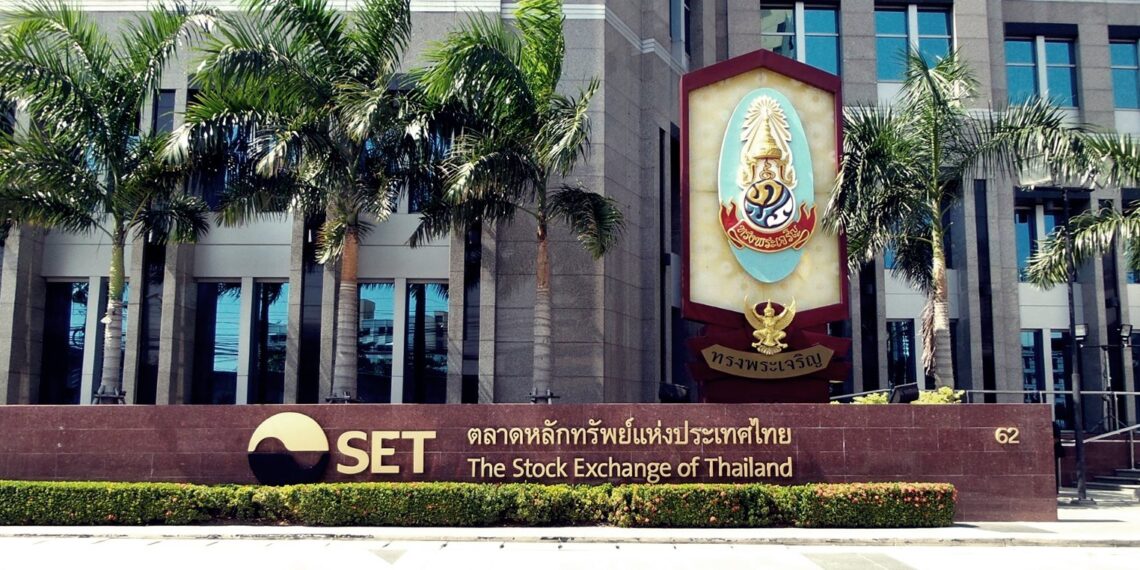No products in the basket.
Thailand’s SET Index rose slightly amid slower momentum and subdued Asian sentiment due to US job data concerns, with sideways trading expected. China’s CPI growth missed forecasts, while Japan’s GDP fell short of estimates. U.S. Treasury Secretary Yellen reassured on economic strength despite job growth slowdown.
Here’s a summary of key market movements:
- Thailand’s SET Index closed at 1,431.13 points, up 0.24%, with a trading volume of 87.21 billion baht.
- The S&P 500 ended the week down 4.3%, marking its worst week since March 2023.
- The Nasdaq closed down 5.8% for the week.
- The Dow Jones Industrial Average rallied nearly 500 points, gaining over 1% to start the week.
- The JSE was mainly higher, with the All Share index up by half a percent.
- Wall Street surged following European stock gains fueled by rate cut hopes.
Key trends and developments observed:
- The Federal Reserve’s upcoming rate cuts are expected to influence investment strategies, prompting investors to reassess their portfolios.
- Trading volume flowed towards the SETESG index in Thailand, anticipating the launch of the new “Vayupak Fund” in October.
- Financial and tech stocks contributed to the Dow Jones’ gains.
- Concerns about September’s economic performance and upcoming data releases are influencing market sentiment.
Thai Stock Market Overview
Thailand’s SET Index closed at 1,431.13 points, rising by 3.49 points or 0.24%, with a trading value of 87.21 billion baht. Analysts noted a slowdown in the market’s upward momentum after a consistent rise the previous week. This trend was influenced by weak market sentiment in Asia, spurred by disappointing US job data, raising fears of a potential economic recession. Investors also remained cautious, awaiting the first debate featuring Donald Trump and Kamala Harris. The analyst expects the Thai market to trade sideways tomorrow.
China’s CPI growth missed forecasts
Key information regarding China’s CPI growth:
- August 2024: CPI rose by 0.6% month-on-month, missing expectations of 0.71% growth.
- Previous months: Similar trends of subdued CPI growth have been observed in previous months, such as June (0.2% growth, missing expectations of 0.4%) and July (0.4% growth, missing expectations of 0.5%).
- Reason: Lackluster domestic demand since the pandemic is cited as a key contributor to the subdued inflation.
- Consequences: The missed forecasts have raised concerns about deflation and potential impacts on China’s economic growth, which is already expected to fall below the official target of around 5%.
Several factors are contributing to China’s subdued consumer prices:
- Weak Domestic Demand: Consumer spending has not fully recovered post-pandemic, leading to lower demand for goods and services.
- Economic Slowdown: Slower economic growth rates have resulted in reduced consumption and investment, impacting overall demand.
- Deflationary Pressures: There are concerns about deflation, which can lead consumers to delay purchases in anticipation of lower prices in the future.
- High Savings Rates: Many consumers are saving more instead of spending, reflecting uncertainty about the economy.
- Supply Chain Issues: While some supply chain disruptions have eased, lingering issues can affect pricing and availability of products.
- Government Policies: Measures aimed at stabilizing the economy, such as tightening regulations in certain sectors, can also dampen consumer spending.
- Global Economic Conditions: External factors, including global inflation and economic uncertainty, can influence domestic price levels.
Global Economic Indicators
China’s consumer price index (CPI) increased by 0.6% year-on-year in August, below the expected 0.7%, due to price declines in transportation, home goods, and rents. Despite a 2.8% rise in food prices, moderate CPI growth was observed. Japan’s second-quarter economic growth also fell short, growing at an annualized rate of 2.9%, below the forecasted 3.2%. U.S. Treasury Secretary Janet Yellen reassured the public about the U.S. economy’s strength amid concerns over disappointing job reports, emphasizing that the economy is recovering and near full employment.
Discover more from Thailand Business News
Subscribe to get the latest posts sent to your email.











